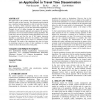Free Online Productivity Tools
i2Speak
i2Symbol
i2OCR
iTex2Img
iWeb2Print
iWeb2Shot
i2Type
iPdf2Split
iPdf2Merge
i2Bopomofo
i2Arabic
i2Style
i2Image
i2PDF
iLatex2Rtf
Sci2ools
112
click to vote
GIS
2009
ACM
2009
ACM
Machine learning approach to report prioritization with an application to travel time dissemination
This paper looks at the problem of data prioritization, commonly found in mobile ad-hoc networks. The proposed general solution uses a machine learning approach in order to learn the relevance value of reports, which represent sensed data. The general solution is then applied to a travel time dissemination application. Through the use of offline learning, the paper analyzes the feasibility of the proposed approach and compares the accuracy performance of several common machine learning algorithms. The results show that not all machine learning algorithms may be used for prioritization and that the use of the logistic regression algorithm is particularly suited for the problem. The learned logistic regression model is then used in a simulated VANET environment. The results of the simulations show that it is better at prioritizing reports in terms of their usefulness in aiding vehicles to choose the shortest travel time paths. Categories and Subject Descriptors H.4.3 [Information System...
Related Content
| Added | 25 Jul 2010 |
| Updated | 25 Jul 2010 |
| Type | Conference |
| Year | 2009 |
| Where | GIS |
| Authors | Piotr Szczurek, Bo Xu, Jie Lin, Ouri Wolfson |
Comments (0)

